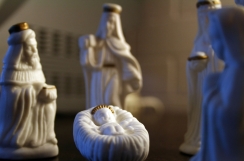I was surprised to find a book entitled 'The Atheist's Guide to Christmas' (HarperCollins, 2009) prominently displayed while out shopping for presents a few days ago.
Of course, I shouldn't have been. Atheism is fairly fashionable, the book has an eye-catching design, and in the often-predictable world of festive retailing it certainly has novelty value. Also, it actually looked quite good – with six sections, including short stories, science, arts and philosophy.
Is it possible for Christians and atheists to find any common ground at all at Christmas? In some obvious ways, perhaps not – and we'll come to that shortly. But first, here are some things we can perhaps agree on with many atheists:
1. There's lots about Christmas which is not especially Christian. Flying reindeer, Christmas trees and fairy lights, to name but a few; which is not to say that they aren't fun – just that they have nothing to do with Christ. And, yes, if Christmas has taken over some pre-Christian traditions (such as the Yule log) there is no problem in us recognising that either.
2. There's too much consumerism. the recent import of Black Friday from the United States is a woeful manifestation of materialism at its most rampant, as many ethically-minded atheists recognise.
3. It's good to have a mid-winter celebration. Whatever else one might say, the nights are long, the days are short, the skies are often grey and we need cheering up at this time of year.
And here are some things, perhaps, we would want to encourage atheist friends to think about at this time of year:
1. It's untrue that the narratives of Jesus' birth are a re-telling of pre-Christian religious tales. A common urban myth is that the nativity stories are somehow re-workings of Mithras, Horus or Osiris. But they're not. Read more here, for example, if you want to follow this one up.
2. It's not only religious people who can indulge in circular reasoning. One of the contributors to 'The Atheist's Guide to Christmas', the illusionist Derren Brown, has elsewhere criticised Christians for a belief system in which "essentially, one believes X so strongly that all evidence that does not support X is ignored, and all events that fit in with X are noticed and amplified".
But as one reviewer of the book observes: "I am not a Christian... but I can now see that these people – and myself – are making the same fundamental errors that they accuse the religious of making: mainly circular reasoning and ignoring all evidence that contradicts their beliefs."
3. Consider Jesus rather than 'God'. While there are arguments for the existence of God (see Timothy Keller's book 'The Reason for God' (Hodder and Stoughton, 2009), for example), it's much better to start by considering Jesus. Read a Gospel in modern English, for example – or attend a Christianity Explored course.
4. There's a simple prayer every atheist should consider. While working as a journalist I once had a long chat about faith with a colleague. At the end, I suggested to him (kindly, I hope): "Why don't you consider praying a very simple prayer – even if you don't believe in prayer – along the lines of, 'God, if you're there, please show yourself to me'." I added: "I believe the person who prays that – sincerely – will always be answered somehow in due time."
A week later, my friend remarked to me: "I thought about praying that prayer – but I decided not to, in case God actually answered..." I felt sad; it turned out his atheism was based on a lack of open-mindedness.
Finally, of course, we will simply want to say to atheists: may you know peace, kindness and grace at this time. Happy Christmas!
David Baker is a former daily newspaper journalist now working as an Anglican minister in Sussex.
















